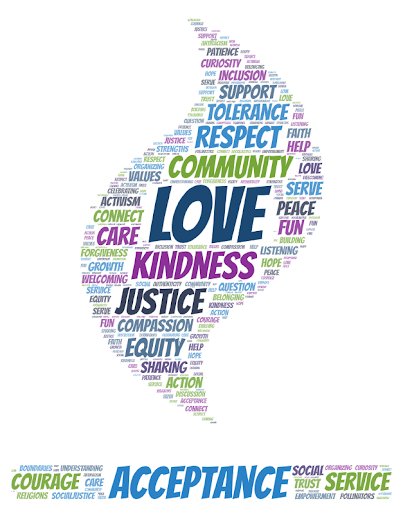Robin Mitzcavitch, Director of Religious Exploration & Education

Have you ever tried to explain to someone in your “outside of church” circles the reasons why you attend church at UUCW? There have been discussions about UU “elevator” speeches. How would you describe Unitarian Universalism to someone during a short elevator ride? I feel like this is more a defining of the religion itself and less of a testimony of why you specifically attend.
Last November, I asked the congregation, including the children and youth, to participate in a project that is being call Threshold Conversations, spearheaded by the work of religious educators from several UU institutions including the UUA, LREDA, The Fahs Collaborative at Meadville Lombard, and Starr King School for the Ministry.
UU religious educators were asked to engage folks in our congregation to answer a question using only 1-3 words. The question? Why do you come to UUCW? The answers were uploaded into a site where they could be retrieved by the Threshold Conversations group to use for their work. Thank you for participating!
Quoting their statement, this is a reminder about the scope and vision of the work that the Threshold Conversations group hopes to accomplish by analyzing your words.
“The goal of Threshold Conversations is to update, reimagine, and renew the work of Essex Conversations: Visions for Lifespan Religious Education, first published in 2001. Like the contributors to Essex, we seek to understand and attend to the emergent needs of our Unitarian Universalist communities – but also of a complex world beyond it that needs our faithful attention, grounded in the values and principles we share as UUs.
Like Essex before it, Threshold Conversations seeks to lift up and promote the essential work of religious education as the learning process through which we grow in faith; ideally as a lifelong endeavor, for all UUs. And now, Threshold Conversations seeks to expand that vision of religious education.
We understand religious education as the ongoing, revelatory work that inspires the formation of faith – a transformative experience that both grounds and compels our faithful action in the world. We are called by our UU theology to be a justice-seeking, change-making, inclusive and welcoming people. As such, faith formation is our most essential and sacred work, and should be at the core of UU identity, culture and community.
Yet we know it is often voices from the margins that lead us onward. We are beckoned toward a future faith that can inspire and sustain and grow souls, beyond what we have known and done before. It is, therefore, a “threshold moment”. We find ourselves in a doorway, our long history of religious education behind us. Before us: an awareness that the future calls us to transform this work of faith formation in ways we cannot yet fully know, but that we commit ourselves to making real. It is a moment of preparation, of readying ourselves in solidarity of purpose, for what is ahead.
Threshold Conversations is not a compendium of engaging activities or best practices, a roadmap, or a blueprint for a successful religious education program. Instead, it seeks to gather and lift up the voices, perspectives, and ideas emerging from the wisdom of our communities. It honors religious education’s past, and the work done by so many to get us here, with an understanding that we are called in this moment, with clarity and purpose, to both shape – and be shaped by – its future.”
Again, Thank YOU for your participation. As a result, your voices were heard and recorded. In return, your answers were transformed into a “word cloud” that reflects the relative strength (commonality) of those answers. Below is our own unique “word cloud” that will be on display around the church. The larger the words, the more they were collectively used in your answers. But all the words presented here are important and crucial to our work as religious educators and stewards of our faith community.
I am not surprised in the least that the largest word in our UUCW “word cloud” is LOVE.
With Love and Appreciation,
Robin

